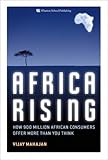Ode checks in with Vijay Mahajan, author of Africa Rising: How 900 Million African Consumers Offer More Than You Think, of which you’ll find an exclusive excerpt in the October 2008 issue.
Brigid Marshall | September 2008 issue

Why did you want to write about Africa’s consumer market?
“When I finished my last book, The 86% Solution [about how 86% of the world has a per capita gross national product of less than $10,000 per year—BM], I realized I did not have too much information on Africa. Yet, there are 900 million people in Africa! I decided that I would write a book about Africa’s market. Writing about Africa isn’t part of my mainstream research, but at my old age at 60, it’s nice to know I can still be learning things.”
What did you learn?
“I had never been to Africa before, though I had a certain expectation of disarray and poverty. Part of that is just that we’re part of different cultures. Walking down the streets I noticed that people in these areas would be shampooing their hair on the streets. It was quite a shock for me. Since I was there learning about consumers, I realized that they were shampooing their hair on the streets because they don’t traditionally sell shampoo to individuals there. It made them look more primitive than they were. Now I know that here there was poverty, but it’s no different than in other places I have been to from Mexico to Rio or India. I’ve learned Africans are ambitious, smart and intelligent people, and that decision makers at large corporations need to realize that Africa is not a basket case.”
Was that a new insight to you?
“Well, years ago, I was asked to give a talk at Wharton, the University of Pennsylvania’s Business School, on how to stop developing countries from begging. I realized the connotation of poor countries as beggars is quite offensive. That prompted me to look into the economy of developing countries.”
What made the writing process of Africa Rising different from other books?
“This time, I had to travel and see for myself what I was writing about rather than simply doing some research behind my desk. It was a very hands-on approach.”
Exciting!
“Yeah, and I even went to places that people told me not to go like the more dangerous ‘high density,’ crowded parts of town. I had the perception that there was going to be tons of crime out there. Once I arrived I did have to be careful, but not any more than in other countries. When I tried to rent a car I did have a culture shock because there were three options: The first option was a car with a driver, a bodyguard and a first aid person. The second was a driver and one person who functioned as the bodyguard and first aid person. The third was all three in one. They thought I needed those options because I was coming from America.”
Was it easy to get Africans participating in your research?
“Actually, the hardest part was convincing people to participate in interviews. They simply could not understand that someone from a United States business school was interested in the positive aspects of what was going on in Africa. They’re used to the only impression being that Americans are coming to do aid work or to report on violence.”
What is your advice to those who want to get more involved in the African market?
“The one piece of advice that I stress is in the book’s last chapter. It’s about the word Ubuntu, a Zulu word from South Africa, meaning: I am because you are. We’re all in this together. Whether developing green products or social organizations, one can’t do that without getting involved with the African community as well as the rest of the world community. My advice is that everyone must become involved in the African market. Ubuntu, it’s the word that catches everything.”
What are you working on now?
“When I traveled in Africa, and realized that almost one-third of all the Muslims live in Africa, I got a very interesting idea for my next book. At this stage I’m putting my thoughts together to understand consumers in the Muslim world. After all, aside from terrorists and fundamentalists, we don’t hear too many things about Muslims. We don’t get the real people, their culture and livelihoods. Just like in Africa Rising, we need to get the story of the people as consumers.”











